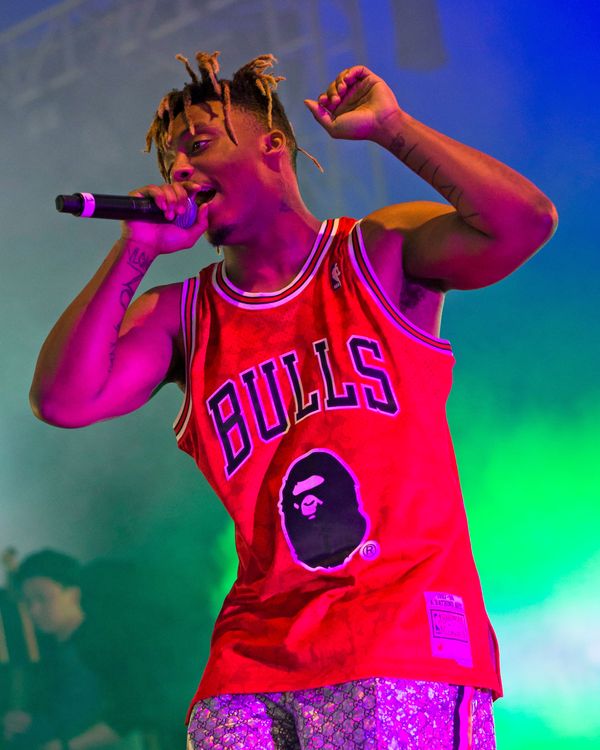
Every week, Vulture runs through the best, most interesting, and sometimes most confusing rap releases. In this installment: Juice WRLD hones his style, a rapper named Dave goes on a journey of self-discovery, and West Oakland’s perpetually underrated J. Stalin continues to shine.
Juice WRLD, Death Race for Love
Juice WRLD became a sensation off the same Sting sample that opens It Was Written and the same outré emoting that anchored Kid Cudi’s mixtapes. Kids found and loved his SoundCloud work, the numbers exploded, Interscope gave him $3 million. He’d performed in public one time before the record deal. He is not a grassroots hero so much as an algorithmic end point, the natural, mathematical conclusion drawn from streaming data and expensive stylists. It’s difficult to hear a three-song stretch from one of his records, or to see a picture of him, or to watch his digitized image on Instagram stories without imagining a record executive pointing with a bony finger and telling his new signee, “Be more like Juice WRLD.”
There are times when I think Juice is attacking me, personally, with his song titles: “All Girls Are the Same,” “End of the Road,” “Betrayal (Skit),” “Scared of Love,” “HeMotions,” “Flaws and Sins,” “Who Shot Cupid?,” “She’s the One,” “Syphilis,” “Karma (Skit).” There is, perplexingly, no wink at the camera here: He’s this bleeding-heart earnest about everything he does, which is bound to endear him to a flock of teenagers. I don’t say that disparagingly: Music seldom means more to listeners than it does when those listeners are in high school, and Juice meets his audience on their level. The problems, when there are problems, arise because he writes the kinds of lyrics that those same kids would scribble in their notebooks after being moved by a more original song.
Death Race for Love has a cover made to look like a PlayStation game and is, fittingly for this era, as much an unceremonious USB-drive dump as a crafted album. That suits Juice, whose appeal lies in part with his ability to move between popular contemporary styles; the adaptability is always going to reflect better on him than any long-form emotional arcs or plays for narrative cohesion.
He’s a practiced rapper and pliable, if slightly indistinct vocalist. He brags frequently about his freestyling abilities, and while the writing is seldom captivating (save for the moment when he says, “I can change anything, got them Obama eyes”), that improvised feel is necessary for his music to feel alive. The beats, which pull from across the current SoundCloud scene and rap radio from the last five years, tend toward the showy and overproduced, and a stiffer rapper would make the album feel stifling. If there is one compelling thread that runs through Death Race, it’s that Juice knows how and when to inject a tiny bit of chaos into a controlled environment.
That said, the album’s 72-minute running time is impossible to justify. The style-hopping also occasionally lands with a thud: “Big” is Future karaoke, in an era that is in some ways defined by unconvincing Future karaoke. “Out My Way,” through, is an unqualified success, serrated and confrontational. I would go broke betting on Juice WRLD’s career prospects: His rapid rise seems, in many ways, to be an accident of the moment, but he’s also young, industrious, and working in a time from which no one seems to really disappear.
Dave, Psychodrama
Centuries from now, archaeologists will only be able to dig up the artifacts that Drake remixed. His grafted verse on a song called “Wanna Know,” by a 20-year-old rapper from South London who cares little enough about search-engine optimization to call himself Dave, earmarked the politically engaged young artist as one to watch on both sides of the Atlantic. Psychodrama, Dave’s debut album, is a heavy record — topically, but also musically, in step with his low baritone — that is framed as a series of windows into Dave’s therapy sessions. That’s a concept that, in most hands, would be overwrought at best and insufferable at worst. But Dave has a light enough touch to sell his neuroses as honest work toward self-improvement and a young enough perspective that his overtly sociopolitical writing feels like personal discovery. The Burna Boy–assisted “Location” should be a staple this summer.
J. Stalin, Avatar 2 / J. Stalin & Lil Blood, 1034 EP
This publication runs a series called Fixations, where writers go on at length about small moments in pop culture — phrases uttered by cooking-show hosts, a painting of a baseball player as a centaur, a Sumerian goddess’s romantic demand — that would otherwise be deemed too small or tangential to receive serious attention. My version of this is the moment, starting at about the 2:05 mark in the video for the remarkable song “No Way,” when J. Stalin exits a convenience store, puts a white T-shirt on over his previously bare chest, then carefully and dramatically untucks what must be $60,000 or $70,000 worth of jewelry. There are two new dispatches this week from the woefully under-covered West Oakland rapper: an EP with Lil Blood called 1034 and a solo-ish effort called Avatar 2, where Joseph Kay plays a silk-voiced Ghostface to Stalin’s Raekwon and which has one of those album covers you try and fail to banish from your memory.

